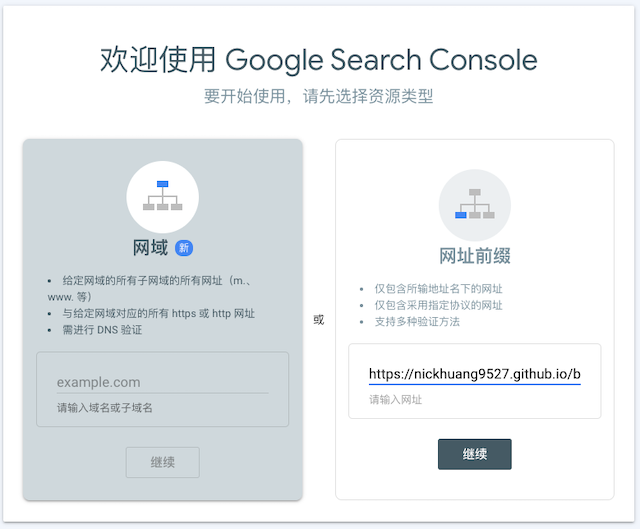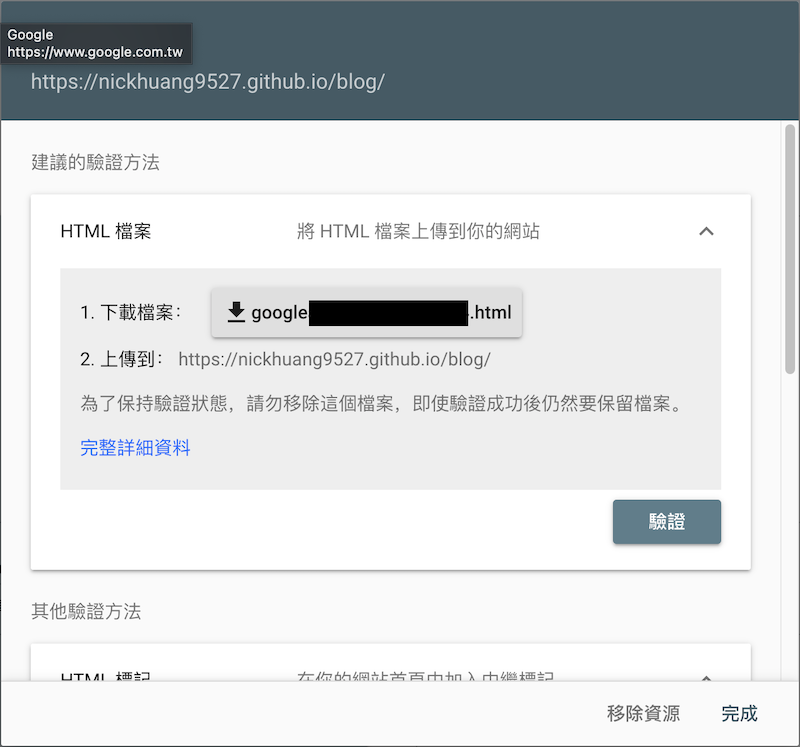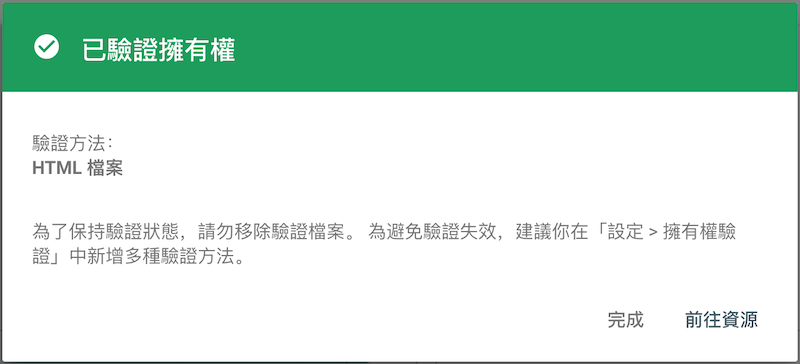SEO Guide: Add Your Octopress Blog to Google Search Console for Better Visibility
Can’t Find Your Blog on Google Search?
When we set up an Octopress or Jekyll blog, we might encounter a situation where searching for our website name on Google yields no results.
Don’t worry - this doesn’t mean there’s something wrong with your website. It simply means we haven’t actively submitted it to Google’s search engine yet.
Why SEO Matters for Your Blog
Search Engine Optimization (SEO) is crucial for blog success:
- Increased Visibility: Help readers find your content
- Organic Traffic: Drive free, targeted visitors
- Credibility: Higher rankings build authority
- Long-term Growth: Sustainable traffic source
Add Your Site to Google Search Console
First, open Google Search Console
Then, choose the “URL prefix” method to add your website, enter your blog domain name, and click continue.

Google will ask you to download an HTML file like this:
googlexxxxxxxxxx.html
Place this file in your project folder:
octopress/source/
Then remember to commit and push to GitHub:
rake gen_deploy

After deployment, return to Search Console and click “Verify.” If everything goes smoothly, you’ll see a success message 👍

Understanding Google Search Console
What is Google Search Console?
Google Search Console is a free service that helps you:
- Monitor Performance: Track how your site appears in search results
- Submit Content: Tell Google about new or updated pages
- Fix Issues: Identify and resolve search-related problems
- Understand Traffic: Analyze search queries and user behavior
Key Features
| Feature | Description | Benefit |
|---|---|---|
| Performance Reports | Track search queries and clicks | Understand what content works |
| Coverage Reports | Monitor indexed pages | Ensure all content is found |
| Core Web Vitals | Check page speed metrics | Improve user experience |
| Mobile Usability | Test mobile-friendly design | Reach mobile users |
Advanced SEO Configuration
XML Sitemap Setup
Create a sitemap.xml file to help Google discover your content:
<?xml version="1.0" encoding="UTF-8"?>
<urlset xmlns="http://www.sitemaps.org/schemas/sitemap/0.9">
<url>
<loc>https://yourdomain.com/</loc>
<lastmod>2024-01-01</lastmod>
<changefreq>weekly</changefreq>
<priority>1.0</priority>
</url>
<url>
<loc>https://yourdomain.com/blog/</loc>
<lastmod>2024-01-01</lastmod>
<changefreq>daily</changefreq>
<priority>0.8</priority>
</url>
</urlset>
Robots.txt Configuration
Create a robots.txt file in your root directory:
User-agent: *
Allow: /
Sitemap: https://yourdomain.com/sitemap.xml
Meta Tags Optimization
<!-- Optimize your HTML head section -->
<head>
<title>Your Blog Title - Descriptive and Keyword-Rich</title>
<meta name="description" content="Compelling description under 160 characters with relevant keywords" />
<meta name="keywords" content="relevant, keywords, for, your, content" />
<meta name="robots" content="index, follow" />
<link rel="canonical" href="https://yourdomain.com/current-page" />
</head>
Content Optimization Strategies
Keyword Research
- Use Google Keyword Planner: Find relevant search terms
- Analyze Competitors: See what keywords they target
- Long-tail Keywords: Target specific, less competitive terms
- User Intent: Match content to search intent
Content Quality Guidelines
- Valuable Information: Provide useful, comprehensive content
- Regular Updates: Keep content fresh and current
- Internal Linking: Connect related posts and pages
- External References: Link to authoritative sources
Technical SEO
- Fast Loading: Optimize images and minimize HTTP requests
- Mobile Responsive: Ensure mobile-friendly design
- Clean URLs: Use descriptive, keyword-rich URLs
- Structured Data: Implement schema markup
Monitoring and Analytics
Google Search Console Metrics
Track these key performance indicators:
- Search Impressions: How often your site appears in search
- Click-Through Rate (CTR): Percentage of clicks from impressions
- Average Position: Your ranking position in search results
- Indexed Pages: Number of pages Google has indexed
Performance Monitoring
# Check site loading speed
curl -w "@curl-format.txt" -o /dev/null -s "https://yourdomain.com"
# Monitor Core Web Vitals
# Use Google PageSpeed Insights
Regular SEO Audits
- Technical Issues: Check for crawl errors and mobile usability
- Content Quality: Review and update outdated content
- Keyword Performance: Analyze search query reports
- Competitor Analysis: Monitor competitor rankings
Common SEO Issues and Solutions
Site Not Indexed
Problem: Your site doesn’t appear in search results Solutions:
- Verify Google Search Console setup
- Check robots.txt for blocking directives
- Ensure site is accessible to crawlers
- Submit sitemap manually
Low Search Rankings
Problem: Site appears but ranks poorly Solutions:
- Optimize page titles and meta descriptions
- Improve content quality and relevance
- Build quality backlinks
- Enhance page loading speed
Duplicate Content Issues
Problem: Multiple URLs with similar content Solutions:
- Use canonical tags
- Implement proper redirects
- Consolidate similar content
- Use hreflang for multilingual sites
Best Practices for Octopress/Jekyll SEO
Configuration Optimization
# _config.yml
title: "Your Blog Title"
description: "Your blog description for search engines"
url: "https://yourdomain.com"
author: "Your Name"
permalink: /:year/:month/:day/:title/
Post Front Matter
---
layout: post
title: "SEO-Optimized Post Title"
description: "Compelling meta description under 160 characters"
tags: [relevant, tags, for, SEO]
categories: [Category]
---
Image Optimization
<!-- Use descriptive alt text -->
<img src="/assets/img/example.jpg" alt="Descriptive image alt text for SEO" />
<!-- Optimize image size -->
<!-- Use WebP format when possible -->
<!-- Implement lazy loading -->
Performance Optimization
Page Speed Improvements
- Image Compression: Use tools like TinyPNG or ImageOptim
- Minify CSS/JS: Reduce file sizes
- Enable Caching: Set proper cache headers
- Use CDN: Distribute content globally
Mobile Optimization
- Responsive Design: Ensure mobile-friendly layout
- Touch-friendly: Make buttons and links easy to tap
- Fast Loading: Optimize for mobile networks
- Readable Text: Use appropriate font sizes
Troubleshooting SEO Issues
Verification File Not Working
# Check if file is accessible
curl https://yourdomain.com/googlexxxxxxxxxx.html
# Ensure proper file permissions
chmod 644 googlexxxxxxxxxx.html
# Check for redirects
curl -I https://yourdomain.com/googlexxxxxxxxxx.html
Search Console Errors
- Check for DNS propagation delays
- Verify HTTPS certificate validity
- Ensure no redirect chains
- Confirm proper canonical URLs
Common Octopress Issues
# Regenerate and deploy
rake generate
rake deploy
# Check for build errors
rake check
# Clean and rebuild
rake clean
rake generate
SEO Tools and Resources
Free SEO Tools
- Google Search Console: Official SEO monitoring
- Google PageSpeed Insights: Performance analysis
- Google Mobile-Friendly Test: Mobile optimization
- Schema.org Validator: Structured data testing
Paid SEO Tools
- Ahrefs: Comprehensive SEO analysis
- SEMrush: Keyword research and competitor analysis
- Moz Pro: SEO metrics and tracking
- Screaming Frog: Technical SEO audit
Learning Resources
Related Articles
- Complete Guide: Build a Professional Blog with Jekyll + Minimal Mistakes on GitHub Pages
- SEO Guide: Add Your Jekyll Blog to Google Search Console and Submit Sitemap
- Advanced Image Optimization Techniques
Next Steps
After verification, you can continue using Search Console to monitor indexing status, search keyword performance, and even submit sitemaps to speed up indexing.
With this step, your website has truly embarked on the SEO journey!
Action Items
- Monitor Performance: Check Search Console regularly
- Optimize Content: Focus on quality and relevance
- Build Backlinks: Earn links from reputable sites
- Track Progress: Monitor rankings and traffic
Long-term SEO Strategy
- Content Calendar: Plan regular content updates
- Keyword Expansion: Research and target new keywords
- Technical Improvements: Continuously optimize site performance
- User Experience: Focus on providing value to readers
If you have different methods, encounter any problems, or want to exchange more SEO techniques, feel free to leave a comment or email me. Let’s research and improve together! 🙂
Enjoy Reading This Article?
Here are some more articles you might like to read next: